08-13-2021
Marissa,
This is a special day
for you. You have gotten the unexpected (and quite welcome)
news that your medical issues are not as serious as we feared.
Given this important
second chance, perhaps you will be in a mood to do me a favor.
I would like you to read a chapter from my book. You may not
agree with my conclusions, but my ideas will definitely give you
something to think about.
It is my understanding
that you continue to punish yourself for the serious mistake you
made back in 2015. There is something I have never told you
about. You might be surprised to know I once made a very
similar mistake to your own. If you are curious, I will be
happy to share the story. I have wanted to speak with you for
several years now, but it is such an awkward subject I have avoided
saying anything. However, I have recently completed a chapter
in my book that addresses my thoughts in a thorough way.
Although my ideas are pretty far out, at least you will understand
why I have long been sympathetic to your situation.
Rick
|
CHAPTER EIGHT:
COSMIC BLINDNESS
Written by Rick
Archer
|
|
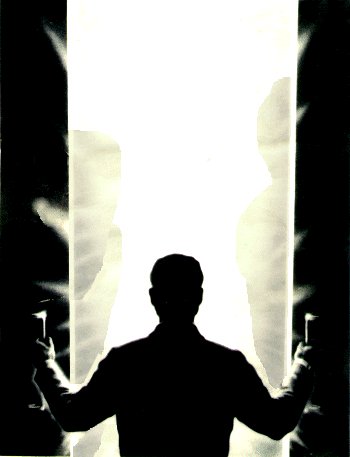 |
Rick Archer's Note:
My theory
of Cosmic
Blindness says at key
points in our life, our common sense will be
temporarily blocked.
I contend our
common sense is removed because Fate decrees
it is time for us to make a serious mistake.
I am not referring to
little mistakes, but rather the costly and quite foolish mistakes
that affect the course of our life. How does one know if they
have been blinded? If you say, "I must have lost my mind," that
is your first clue.
If Cosmic Blindness exists,
how does it work? My best guess is our thoughts are
manipulated beyond our awareness as a way to 'persuade
us' to do something our common sense would ordinarily prevent. How
often this takes place is beyond me, but I doubt it is
frequent. I have observed three distinct experiences
of feeling Seriously Blinded over a 70 year period plus a few
smaller incidents I am not so sure about. When it does happen, my loss of judgment creates a whopper
of a problem. Each of my 'Blinded' mistakes would best be
described as 'Incomprehensibly Stupid'.
As if ruining my life
isn't sufficient punishment, the ultimate slap is being forced to
wonder what could have possibly come over me to make such a foolish
decision. Indeed, following the Cheating Incident on the
German test, I spent
countless hours asking myself how I could have ever
done something so senseless in the first place.
Those hours of contemplation marked the development of this theory,
a process I will describe in this chapter.
Does
Cosmic Blindness really exist or
is this just some goofy idea I made up?
Based on my
personal observation, I am convinced Fate exists and that Blindness
is one of the tools used to enact our Fate. However,
given that this is an extraordinary claim, I do not expect
anyone to readily agree with me. Therefore I am going
to discuss how I reached my conclusion, add several
historical situations to support my claim, then let you make
up your own mind.
|
|
In the
aftermath of the Cheating Incident,
I began the deepest soul-searching of my life.
There was no
obvious Realistic explanation for my downfall. In my heart I
knew I had taken every conceivable step to avoid being caught. My
precautions would have worked had it not been for a near-impossible case
of Bad Luck. My classmate
Bob had returned to the room to
retrieve his missing textbook at the worst possible moment. Bob
had at most a 45-second window of opportunity to catch me. My plan was to
open the book,
take a quick glance to refresh my memory on the German authors, close the book.
45
seconds at most. Adding to the mystery, why didn't I hear Bob
coming?
I had heard Mrs. Anderson when she came upstairs to hand me
my test, so why didn't I hear Buffalo Bob as he thundered up the steps?
To me, there
were only two explanations for Bob's unexpected appearance. One
was my 'Lightning Strikes' Bad Luck theory and the other was my 'Invisible
Man' whisper theory. The odds of being hit by lightning
are remote and yet we hear of people who get struck. In other
words, accidents happen. Maybe Bob's discovery was a Bad Luck
accident.
Or maybe the
Invisible Man made Bob forget his book, then whispered to him to go get
it at the right time. The Invisible Man also made sure I did not
begin cheating until Bob was ready to enter the room. Far-fetched indeed.
However, I was with Sherlock Holmes on this one.
"When
you have eliminated the impossible, whatever remains, however
improbable, must be the truth."
|
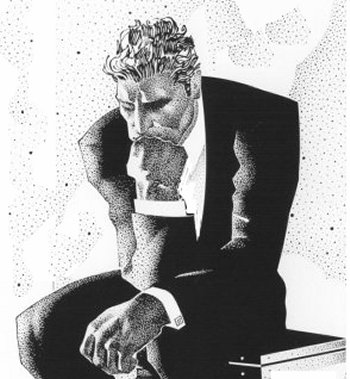 |
A Coincidence is a curious
thing. Sometimes the odds are high that a
Coincidence might occur, sometimes
low. It is one thing to be struck
by Lightning on a clear day. It is another
thing to be struck by Lightning while playing golf
in a thunderstorm. Given the kind of
precautions I had taken, Bob's discovery felt like
Lightning had struck on a clear day. This was a
clear
violation of the laws of Probability. Unwilling
to accept Bob's sudden appearance had happened by
accident, I concluded this Coincidence was
a Fated event.
Let me make
an important point. If Bob's sudden appearance was a random,
isolated incident, I could have accepted that odd things do happen from
time to time and stopped there. However, as we shall see,
three more incidents JUST AS WEIRD hit me in the ensuing months.
At some point, the odds just kept getting more and more remote that
there were logical explanations for these events.
My decision that Fate was present was bolstered by the
return of my Common Sense. First I suddenly
became aware that I had been a complete Idiot to
attempt this in the first place. Second, I
asked myself what had come over me to lose my mind. Never before
in my life had I done anything even remotely this
stupid. I once cut my eye out with a
knife, but I was five years old. Yes, that was exceedingly stupid,
but I forgave myself due to my age.
However I could not forgive myself for this
Cheating incident. This time I was old enough
to know better. Plagued by guilt,
I asked myself
where this Very Bad Idea originated from in the
first place.
Where do senseless, self-destructive decisions come from?
A girl sees a handbag and decides to take it on the
spur of the moment. I get the idea to cheat on
a limited portion of a German test. Not for a
moment do either of us think we will be caught.
That element of our common sense seems to have
completely disappeared. Why? What
happened to our common sense?
Edgar Allan Poe, one of
America's greatest writers, was obsessed by his self-admitted tendency to
deliberately do things that would end up hurting him.
Poe even had a name for it. He called it
'Perverseness'.
"Perverseness
is one of the primitive impulses of the human heart.
It is one
of the indivisible primary faculties, or sentiments,
which give direction to the character of man. Who has not,
a hundred times, found himself committing a vile or a
silly action, for no other reason than because he knows
he should not?”
Was it
Perverseness that got me into trouble? Well, I
suppose so. I have a rebellious side that
likes to cut corners when I am in a bad mood.
But I also have Common Sense. Cheating had
been an act of Colossal Misjudgment. What bothered me was the
utter pointlessness of what I did.
Even if I
succeeded, what exactly did I hope to accomplish? If I
got away with it, no one would know a thing.
But if I failed... Uh, tell me again why I
am
doing this? There's an old saying,
Great Risk leads to Great Reward.
As I said previously, I made 95 on the test.
If I had not cheated, the worst I would have done
was 85. In other words, I risked my entire
academic reputation for 10 points on a
meaningless test. Given that I risked
everything for no possible gain whatsoever, Cheating
had been a Very Bad Idea. Furthermore, why did Mr.
Salls choose to look the other way? That just
added to the weirdness of this incident.
It is one
thing to make an impulsive decision, but that was not the case here. Given how much thought I had
given to how to get away with this Cheating idea, I
assumed I had every angle covered. Feeling invulnerable, gee, what
the heck, I'll go through with it. How could I have anticipated
the surprise arrival of a classmate at the exact moment to catch me?
If someone had been watching me through a window, their timing could not
have been any better than Bob's. There was no window in
the door. Nor was there any way save a ladder to peep in through
the second-story windows. Given the long odds against this
occurrence, I simply could not dismiss my Bad Luck as some random fluke of nature.
Someone had deliberately guided Bob to my room, I was sure of it. If so, I
assumed some sort of telepathic connection between Bob and my Invisible
Nemesis had taken place.
If Bob was
susceptible to a telepathic command, then I was too.
So I asked myself again where this Very Bad Idea had
come from. Was it my very own utter stupidity
that had gotten me into this mess??? Or did some Invisible Being persuade me to do this by tricking me
into thinking this was my own idea? The
ensuing debate led
me to ask the question that
would bother me
my entire life.
Why do
otherwise intelligent people sometimes do
incredibly stupid things?
|
I doubt seriously that I am
the only person to ask why smart people do dumb
things. In fact, given the long list of
comments on human stupidity, I think a lot of people
have wondered the same thing.
"The difference between genius and stupidity is that
genius has its limits."
-- Albert
Einstein (supposedly)
"God must love stupid people; He made so many."
--
Unknown
"My
heart is broken in face of the stupidity of my
species." -- Joni Mitchell
"Talent and
intelligence will not inoculate anyone against the
caprice of the Fates." -- J.K. Rowling,
2008 Harvard speech
"The trouble is, humans have
a knack for choosing
precisely the things that are worst for them."
-- J.K. Rowling, Sorcerer's Stone
|
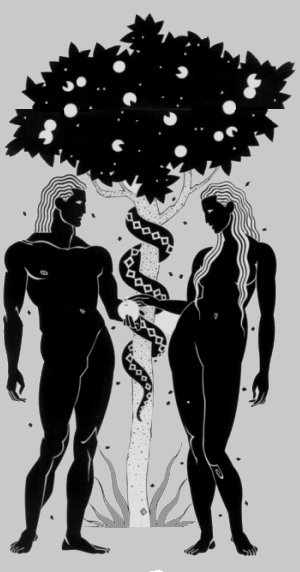 |
Back when I cheated on the German test,
Harry Potter and J.K. Rowling were well in the future.
However, when Ms. Rowling wrote that Humans have 'a knack for
choosing precisely the things that are worst for them', I am
fairly certain she had me in mind. Who else could it
be?
Well, now that I think of it, Ms. Rowling might have been thinking about
Eve and the Apple tree. According to what Moses wrote in Genesis, Eve was the first
human to have a Very Bad Idea. Ms. Rowling might say that Eve had a knack for choosing precisely the thing that was worst
for her.
Assuming Eve is the mother of
mankind, I say blame my Very Bad Idea on Eve.
Thanks to her, Disobedience has been hard-wired into the DNA
of mankind ever since.
So there is my alibi!
Ignoring my Biblical jest, over the centuries
people have tried to understand why intelligent people make colossal
errors of judgment. One need look no farther than the Trojan
Horse. Talk about stupid! How about Napoleon invading Russia
just in time to see the snow fall? Or Hitler making the identical
mistake? Or General Lee sending George Pickett straight into the Yankee
defense at Gettysburg? Or Churchill sending troops into a deadly
ambush at Gallipoli?
And then of course we have poor Captain
Smith, poster boy for colossal lapse of judgment. Picture
Captain Smith of the Titanic as his ship approaches an ice field.
There are
dozens of dangerous icebergs hidden by the black of
night. No one in their right mind would send an unwieldy ship
through a treacherous obstacle course without visibility. Indeed,
just 10 miles away, the Californian has
anchored for the night because its captain
understood this was the sensible thing to do. But no,
Captain Smith, despite 50 years of maritime
experience, despite being responsible for the lives
of 2,500 passengers, decided to drive his ship
straight into danger at full speed with no visibility.
The decision was so bad it seems suicidal in hindsight.
As I will later
show, Captain Smith was considered
highly competent prior to his mistake. Churchill
was voted the greatest man in British history. Napoleon was a
military genius. Until Gettysburg, General Lee ran
circles around the generals of the North. Despite their
brilliance, each man made the worst decision of his life, the kind of
decision that would haunt them forever after. How do we explain
senseless, highly destructive decisions made by men who should have
known better? That is a question people have been asking since the
dawn of time. We accept that normal people like you and me do dumb things, but
one would think our best and brightest would be immune. Apparently
that is not the case. Why do smart people do dumb things?
|
In the early 1930s, physicist Albert Einstein, a pacifist at
heart, was alarmed by the militarization of Nazi Germany.
Unable to understand what seemed to be an innate tendency
for destruction in humans, Einstein wrote to Sigmund
Freud to ask his thoughts on how further war might be
prevented. In response, Freud wrote that
'Thanatos', a death instinct, “is at work in every
living creature and is striving to bring it to ruin and to
reduce life to its original condition of inanimate matter.”
|
Sigmund Freud had a lot to say
about destructive behavior.
To Freud, Thanatos was a way
to relieve Unconscious psychological pressure.
Freud wrote that
patients in psychoanalysis tended to 'Act Out' their conflicts in
harmful ways rather than deal with them in a constructive way.
Many students of human nature have since agreed with
Freud.
Angry kids who have
no way to express their anger to powerful authority
figures often turn their anger
back on themselves. By rebelling, they do things to hurt themselves. Drug
abuse, drinking, overeating, smoking,
shoplifting, bullying, graffiti, cheating,
promiscuity, the list goes on
and on.
Over time, the consensus
explanation is that self-destructive behavior is caused
by anger and
feelings of helplessness. If this tension cannot be released in a
healthy way, it damages the individual's judgment and becomes expressed in
self-harming ways instead.
|
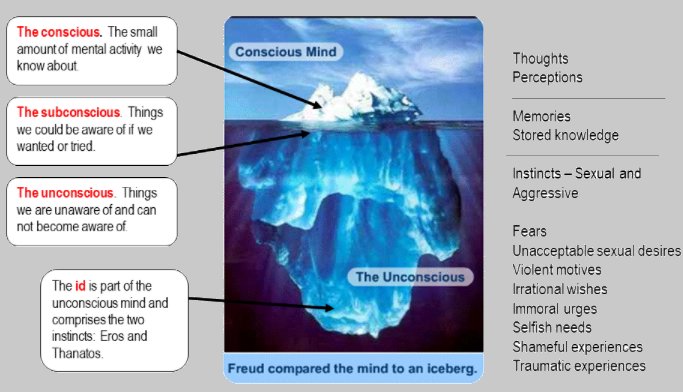 |
Personally, I think the 'Acting
Out'
explanation makes a lot of sense. There is no
doubt about it, when I am angry, I sometimes do
stupid things. Anger makes me impatient, less
cautious, more aggressive. So, like I said, if the Cheating
Episode had remained an isolated event, I could have
accepted Freud's diagnosis and left it at that.
My guess is that Mr. Salls interpreted my behavior
in this way. Since he knew me well from three
years as my German teacher, he chose to give me the
benefit of the doubt. Thank goodness!
However, despite my unexpected
reprieve, I was unable to walk
away from the issue for the specific reason that it
took a Supernatural Event to catch me in act.
Take for example a detective asked to evaluate a
likely suicide. He spots something peculiar that causes him to take a second look.
That was me in a nutshell. The presence of an
apparent Supernatural Event caused me to go past the
obvious explanation of Acting Out. I still
wanted to know why my Common Sense deserted me when
I needed it.
There is Ordinary
Stupidity and Colossal Stupidity. Yes, like a
lot of people, I break rules from time to time.
Fortunately, my better judgment always prevents me
from going too far. Here is an example of
Ordinary Stupidity.
I dislike coming to a complete halt at stop signs
when it is 2 am in the morning. Due to the
absence of traffic, I can see there is no danger.
Rather than brake, I slow down, roll past the sign, then pick up speed again. If I get caught, I
know there will be consequences, but, since I can
afford to pay the fine, I do not consider this to be
'Self-destructive' behavior, but rather a
low-risk dumb idea. That is my idea of
Perverseness... a victimless crime.
And then there is Colossal
Stupidity. Cheating on a German test was
an entirely different thing because the punishment
would have devastated any chance at a college
scholarship. I knew this the
moment I was caught, so why didn't I know this
beforehand? Where did the flaw in my vaunted logic
occur? I suppose Sigmund Freud would have had the
answer.
Freud would have
crossed his arms and said, "Well, young man, aren't you overlooking something?
It was your UNCONSCIOUS that caused you to take this risky and quite
self-destructive chance."
Freud was very fond of the
Unconscious. In his opinion, the Unconscious
was the explanation for all sorts of senseless behavior.
Problem A was caused by a thwarted sex drive,
Problem B was caused by Thanatos, the so-called death
instinct, Problem C was caused by Guilt. Give the guy some credit.
Freud had some wildly creative explanations
including a
Complex for every occasion. Oedipal Complex, Electra Complex,
Inferiority Complex, Adonis Complex, Martyr
Complex, and let's not forget his rather
bizarre Madonna-Whore Complex.
It is no accident the term 'Freudian Complex'
became part of everyone's vocabulary.
The real thorn in
Freud's side was Carl Jung and his mystical 'Synchronicity'
mumbo jumbo. Jung had a
long relationship with Sigmund Freud. They
were contemporaries who even collaborated on
occasion. However, Jung's fascination with the
Supernatural drove a giant wedge between the men.
At one point Freud shook his head and told Jung he
was completely off his rocker. Stung
by Freud's criticism that his theories were
pseudoscience nonsense, Jung withdrew to follow his own path. While Freud
focused on analytical explanations for human
behavior, Jung's preoccupation with the Supernatural led him in
a much different direction. Both men would analyze the same
behavior and reach
totally different conclusions. Comparing the two men, from
where I stood Psychology was no different than
Religion. In Religion, no one really knows what God thinks,
but everyone
loves to argue about it. Psychology is the same way.
Since no one really knows what makes a person tick, they argue a
lot. Some like
Freud's explanations better, some like Jung better. But here's the deal. How
did Freud intend to explain Bob's Supernatural
appearance at the worst possible moment?
Advantage to Carl Jung.
|
Although Freud's Acting Out
argument made a lot of sense, try as I might, I
could not overlook Bob's magical appearance at the
perfect moment to ruin my life. That aspect
threw my thinking directly in line with my Invisible
Man whisper theory. Now I suspected the Invisible Man
had placed the Very
Bad Idea in my mind as well.
If the Invisible Man could persuade Bob to burst
into the room at the exact instant to catch me, then
the Invisible Man could just as easily have
persuaded me to cheat in the first place. This
is when I began to feel 'Set-Up' to be the
patsy here. The Invisible Man had persuaded
me to cheat, then called the cops to catch
me in the act.
In other words, I believed
that someone had deliberately rendered me STUPID in order to take
the fall. To bolster my argument, I had five
previous
incidents that were also suspected Blind Spots.
•
My mother's unforgivable decision to let my dog
Terry loose in a hurricane.
•
My mother's Blue Christmas
madness that almost got us killed.
•
My mother's
inexplicable delay before taking me
to the dermatologist
•
My mother's failure to
recall my child support ended on my 18th
birthday.
•
My failure to realize state
tuition was a fraction of private college
tuition.
However, there was one
problem. I could not think of a single person
to agree with my Whisper Theory. Carl Jung had spoken about
Coincidence, but to my knowledge he never suggested
Leprechauns, Angels, or Invisible Men went
around making people Blind at key moments. In
fact, it took 50 years to find someone with thinking
parallel to mine. By chance, in 2018 I ran across J.K.
Rowling's 2008 Harvard Commencement Speech on the
Internet. Curious, I read her entire speech.
I was very impressed.
One
line in particular stopped me in my tracks.
'Talent and
intelligence have never inoculated anyone against
the Caprice of the Fates.'
|
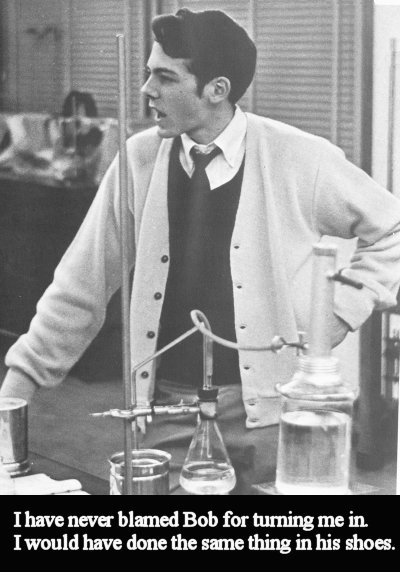 |
Hmm, that sounded like
something I would say. I never had time for Harry
Potter at the height of his popularity. I was
too busy running my dance studio. However,
in retirement, I had the free time to read the
novels. I was deeply amused to
discover that Ms. Rowling divided her Harry Potter
fantasy world into Wizards who hide their powers
and Muggles who are normal humans. The Muggles have no idea a Magic World
exists side by side with what they refer to as 'Reality'.
Furthermore, there was a general understanding in
the Wizard World that Normal Humans are not strong enough
to handle the truth. This caused a serious
problem because Wizards frequently lost
control of their Magic right in the midst of
startled Muggles. Observing an act that broke
the Rules of Reality, a Muggle had no idea what just
happened, but
was intensely curious for an explanation.
Oh no! We can't have Muggles questioning
Reality!
|
Imagine my
delight to read that Wizards had the
power to affect the minds of the
Muggles. Ms. Rowling
made it perfectly clear that Wizards
used mind modification whenever
necessary. The Memory Charm (Obliviate),
also known as the Forgetfulness
Charm, could be used to erase
specific memories from an
individual's mind. A different
charm would create false memories.
As an example,
in Goblet of Fire,
Chapter 10, Mr. Roberts and his
family were seized by Death Eaters
who levitated them into
the air. The defenseless
family were contorted into
grotesque shapes and spun
mercilessly above the ground.
Mr. Weasley, a Wizard, saw what
happened and decided it
was necessary to erase the
terrible memories of the Death Eater
attack.
Mr.
Weasley woke Harry Potter and
his friends after only a
few hours of sleep. He used
Magic to pack up the tents and
they left the campsite as
quickly as possible, passing
poor Mr.
Roberts at the door of his
cottage. Mr. Roberts had a
strange, dazed look about him
as he waved them off with a
vague 'Merry Christmas'.
"Mr.
Roberts will
be all right," said Mr. Weasley
quietly as they marched off onto
the moor. "Sometimes when
a person's memory is modified it
makes him a bit disoriented for
a while and that was a big thing
we had to make him forget."
Mind Control
was a major feature in the Harry
Potter series. The incident
with Mr. Roberts was one of many
examples where a Wizard erased a Muggle's Memory immediately after something
went wrong lest the existence of the Wizard World became common
knowledge.
The
only difference between Ms. Rowling's Wizard World
and my so-called Invisible Men
is that my memory of Bob catching me in the act did not get erased.
Permitted to hang onto my memory as well as my
curiosity, I listed the Cheating Incident as
Supernatural Event #20. Nor did the Magic stop
there. The total on my List will eventually surpass 100.
|
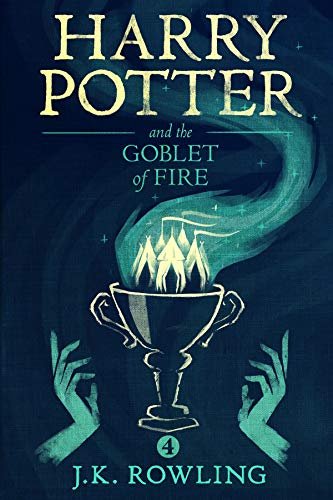 |
RICK ARCHER'S LIST OF
SUSPECTED SUPERNATURAL EVENTS
|
| |
|
020 |
Serious |
Coincidence
Unlucky Break
Cosmic Blindness |
1968 |
| |
Caught cheating on German test due to a very improbable coincidence. The
unacceptable loss of common sense led to the development of Rick's
Cosmic Blindness theory |
|
|
|
So what did J.K. Rowling have
to say about Fate? On this subject, I found very little other than two intriguing hints.
By stating that Intelligence fails to inoculate
"against the Caprice of the Fates",
I assumed she agreed with me that Very Bright
People are capable of doing Very Stupid Things.
Ms. Rowling's second quote, "Humans
have a knack for choosing precisely those things
which are worst for them," suggested she
too has observed baffling examples of Senseless Stupidity in people who should have
known better.
However, nowhere in her books
does Ms. Rowling suggest Wizards are assigned the task of making
people Blind as a way to cause
a Destiny-altering mistake. In private she might agree
with me, but more likely Ms. Rowling is too smart to open that
controversial door.
"Oh no, Rick, you bring it up, be my guest."
|
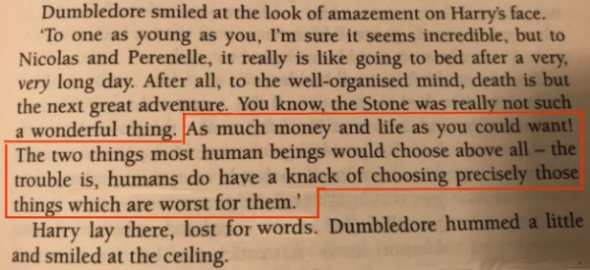 |
So I am left with a
Circus of conflicting theories. Moses offers
Eve as a
Religious explanation for dumb ideas. J.K.
Rowling offers a Magical
explanation for dumb ideas. Sigmund Freud
offers Thanatos and the Unconscious as a Psychological explanation for dumb ideas.
What do these three classic lines of thinking
have in common? None of them can be proven. They are Theory, not fact. No one has ever spotted the
Unconscious under a microscope. Critics who
doubt fantastic stories in the Bible are limitless.
Harry Potter's World of Wizards is nothing more than
clever make-believe.
So here is my point: It is very clear that
human behavior is a mystery to us all. Everyone has a theory, but
deep down no one is certain what the reason is. As a result we all wonder just what the heck is really going on.
Understandably, Scientists prefer Reality-based explanations while
Believers are more willing to accept that God periodically
intervenes in the affairs of Man. However, even people who believe
in God have a hard time accepting that Fate exists and that our minds
are periodically manipulated beyond our awareness.
Carl Jung is one of the few notable people who
publicly state
there is much more to this world than meets the eye.
Carl Jung suggested a 'Meaningful Coincidence'
is evidence that the affairs of mankind are manipulated behind
the scenes by the Cosmos. Although Jung was subjected
to considerable scorn, I liked what he said. Experiences such as
the Cheating episode persuaded me to give Coincidences a closer
look. Since modern
miracles are few and far between, in my search for evidence
of God's existence, like Carl Jung, I settled on mysterious
coincidences and improbable events as my best bet to bolster
my confidence in the existence of a Hidden World.
Where did that Very Bad Idea come from in the first
place? As I said earlier, I nursed a
strong suspicion that God (or an Invisible Agent of God) had planted that rotten idea
in my mind, then guided Bob to catch me at the right
time. If so, then this had been an act of Fate. My conviction was
bolstered by previous events. Here at age 18,
I could think of 19 previous events odd enough to arouse
my suspicion. However, none of the previous
events were equal to this.
The Cheating Incident was a Game Changer because I believed I was facing the first indisputable case of
Divine Intervention of my life.
It was
not that I got caught that bothered me the most. It
was HOW I got caught.
The circumstances surrounding my exposure were so
strange that I was almost certain this was God's
doing.
Good grief, who could imagine this truly mortifying
experience would suggest the existence of God. Nevertheless, that
is how I felt. The Belief that I was in the presence of God
left me awestruck. Ignoring
my shame and guilt as best I could, I felt humbled and
flattered to be singled out for a clear demonstration of
the Power of God. They say God works in subtle
ways, BUT NOT THIS TIME! God's Fingerprints were
all over this. My
first instinct was that God wanted to teach me a
lesson. Consider it done. From
now on I
was through cheating on anything, be it cards, sports, German
tests, and so on. My Code of Honor had just
received a considerable upgrade.
My next thought
was to wonder if other people had ever blamed God for a
senseless mistake. Apparently so. The eminent Mark Twain
once made an interesting observation.
"There are many scapegoats for
our sins, but the most popular is Providence."
Hmm. In that case, add me to the
list. Apparently I am not the only person to
ever wonder if Bad Luck has a Divine Origin. Largely convinced that God had
set me up for failure, I asked myself why would God do
this. Over the years, I have come to believe God
teaches lessons by placing obstacles in our path.
This of course brings up the question of Free Will.
Sorry to say, I no longer believe in complete Free
Will.
As for the
percentage, who can say?
I have made three Colossal Stupid
Mistakes in my life and several others I find
curious. While each mistake threw
me for a serious loop, over the course of 70 years,
'Three' is not a large number.
Consequently it does not seem to me that 'Bad
Luck Fate' interferes all that often. And
of course no one seems to mind when the Good Luck
appears.
Given the uncertainty regarding God's Will and
Rick's Will, I follow my own guidelines with the understanding that God
has the power to redirect me whenever He pleases. Due to this
attitude, I scrupulously follow the Rules of Reality at all times. Healthy
diet, seat belt, follow the doctor's advice, lots of exercise, avoid
being self-destructive, obey the Ten Commandments. Following the Rules of Reality
may not guarantee a long life, but avoiding the Rules of Reality will
definitely guarantee a short life.
The esteemed physicist Stephen
Hawking said it best.
"I have noticed people who claim everything is predestined and
that we can do nothing to change it still make a habit
of looking before they cross the road."
As far as I'm concerned, the Rules of Reality apply at all times.
If God chooses to intervene, that is up to Him, but
to walk in front of an oncoming truck without
looking is a certain road to ruin. And don't
expect a surefire trip to Heaven either. Why would God want idiots
messing up the place? The point is, if Fate exists, there
will be times when we are not totally in control of
our own lives. Nevertheless, we must ALWAYS ACT AS IF WE ARE IN
CHARGE.
The key feature of the Cheating Episode was the
million to one possibility that Bob would burst into the room without
warning. If I had not been caught, I would have NEVER given these
strange ideas a second thought.
Awestruck,
I was no longer confident the
way I viewed the world was the way it really was.
For
example, we all know that God prefers to remain invisible. Or does
He? Yes, Bob caught me red-handed, but in the process I felt like
I had caught God red-handed too.
|
This Coincidence was so blatant I
wondered if I had been handed this eye-opening event for a
purpose. As a
result, the Cheating Episode set my mind to thinking in a
completely new way about how the World works. And, just in case I was still
on the fence with these ideas, I was hit with four more
rat-a-tat Supernatural Events in a six month span.
Reeling from this determined assault on my previous sense of
Reality, I interpreted the unusual events of my life in a
startling new way.
I did not think much about God in
those days. I was far too focused on my own problems.
However, that changed in a hurry thanks to Bob. The
more I thought about it, the more convinced I became that
God had been responsible for springing this trap. I
trembled at the implications of this wild possibility.
Why in the world would God trip me up? I thought God
was supposed to be my friend! Whatever happened
to "Lead me not into Temptation but deliver me from Evil"?
So
much for the Lord's Prayer.
Not
only had God failed to deliver me from Evil, more likely He
led me straight into it.
But then my Headmaster looked the
other way. That was bizarre! Was Mr. Salls yet
another victim of the Invisible Whisper? It felt like
God wanted to startle me, but did not intend to punish me.
Maybe God was just trying to get my attention.
Fortunately, the ensuing events
brought things into sharper focus. Faced with five
Supernatural Events in one year, I decided God had
deliberately opened my eyes. Now that God had my full
attention, I decided it
was my duty to investigate the mysteries of life. In other
words, getting caught cheating on a German test was the
pivotal moment that started me on the path to the
Gypsy Prophecy.
|
 |
FURTHER THOUGHTS
ON THE THEORY OF COSMIC BLINDNESS
|
The moment Bob burst in
the room to catch me cheating,
I was hit with an overwhelming feeling that forces beyond my
control were responsible for my downfall.
Filled with a lethal combination of shame, guilt
and confusion, I asked myself over and over
again what went wrong. Why did I do this
in the first place? Why did my my judgment
desert me at a time when I needed it the most?
Call
it my 'Casey at the Bat'
moment. Casey is the best baseball hitter of
all time. He has never failed in the clutch.
Casey is so confident in his ability that he is unable to fathom striking out when it
matters the most. In a similar vein, I
believed in my own Intelligence. My Better Judgment
had never failed me. My Better Judgment had rescued me
from countless Bad Ideas over the years. However,
today my Better Judgment
deserted me in the moment when I needed it the most.
"A
man's gotta know his Limitations."
-- Clint Eastwood, Magnum Force
The moment Bob left the
room, I knew that he was going to turn me in.
It was written all over his face.
Chagrined, I still remember the first
thing I said to myself. "I'm too smart to do
something this dumb." Oh
yeah? Then why did I do it? Like
Casey at the Bat, I had just struck out for the
first time in my life. This called for a
serious reassessment of my ability.
|
We all have a pretty good
idea of what we are capable of. That
includes both good and bad. Based
on prior experience, I had a firm grasp of my Best and
Worst so far. Then one day I did
something so totally Stupid it
surpassed my previous High Water Mark by a wide
margin. In other words, when I cheated on the
German test, I exceeded my Limitations.
It wasn't just that I set
a new mark, I OBLITERATED my previous
standard. Afterwards, I was so stupefied
by the extreme nature of my mistake, I obsessed
about it endlessly. Wracked with guilt, I could not get the mistake out of my mind.
Most people would have
attributed my mistake to immaturity and the
intense psychological pressure I was under (and
rightly so).
However, in my case, the presence of Bob's
sudden appearance to catch me red-handed led me
to consider a much different possibility. That was my Isaac Newton
moment, the equivalent of an apple hitting me on
the head. The presence of an absurdly Bad
Idea, Bob's uncanny appearance, and Mr. Salls'
mysterious pardon gave me three
reasons to wonder if I had been the victim of a
scenario created by a Higher Power.
|
 |
Here I was, ordinarily a
cautious, sensible person who analyzed every move I
made to the nth degree. And yet no matter how
carefully I approached my life, I had failed
miserably in the clutch. Determined to understand
what could have possibly caused me to lose my mind,
I came up with a wild theory. Cosmic Blindness suggests that in
EXTREME cases of poor judgment, a Higher Power may
have been involved. For reasons of Fate,
perhaps our better judgment can be temporarily
short-circuited.
To be sure, Cosmic Blindness is a
far-fetched concept. However I seriously doubt I am
the first person to suggest this controversial idea. When I read that Mark Twain
had said, "There are many scapegoats for
our sins, but the most popular is Providence," I
was reminded of
the oldest excuse in the world, "The Devil made me do it."
Although I don't believe in
the Devil, I will definitely agree that Evil exists in great quantities.
A phrase like 'The Devil made me do it' lingers on
because many people besides me have had the eerie feeling
they were victim of forces beyond their control. I
cannot speak for anyone else, but in my case I have long
been unwilling to accept full responsibility for my
preposterous Cheating mistake. Mind you, in the eyes of society
I have no choice but accept full responsibility for my actions. If Mr.
Salls had chosen to punish me, I would not have
defended myself. Yes, I did the crime, so I
will do the time. However, in the
privacy of my thoughts
I reserve the right to ask if a Higher Power set me up for
failure. And I think my Readers should examine their
own mistakes and ask the same question.
Does Cosmic Blindness exist? In
my heart, I think so. That said, I could be wrong and
do not mind admitting it. However, on the off-chance
I have guessed correctly, the question must be raised. If
Cosmic Blindness is a part of life, it will alter the way we
view our own mistakes.
In particular I hope we become more forgiving of our own worst
mistake and that of others as well.
How the theory of Cosmic
Blindness withstands the test of time remains to be
seen, but let's give it a fair chance. And now
let's have some fun. Let's pretend I am right
and go back through time to reinterpret some of
History's greatest blunders.
|
COSMIC BLINDNESS
THROUGH THE LENS OF MYTHOLOGY:
OEDIPUS, KING OF
THEBES
|
When Bob caught me red-handed, I felt
Blind-Sided. Why had I failed to anticipate someone coming
in the room? What I am getting at is that I had made no
effort to disguise what I was doing in the off-chance someone
showed up. An inconspicuous cheat sheet would have
eliminated this possibility. However, that idea had not
crossed my mind. Why was I so Blind? Perhaps
it had something to do with being Blind in my left eye, but I
had long been worried that I kept making mistakes due to my lack
of self-awareness. For example, I kicked myself every day
for my failure to apply to a State college. How could I
have overlooked this obvious move?
Feeling Blind, it did not take me long to
recall the tragic Greek myth of Oedipus, King of Thebes.
|
Oedipus was
born to King Laius and Queen Jocasta.
Shortly after the boy's birth, Laius was shocked
to learn of a prophecy foretelling his newborn son
would one day murder him, then marry his mother.
Determined not to let this happen, Laius ordered
the baby thrown on the mountain to
die. However, a shepherd found the child
before the wolves and took Oedipus far away to be
adopted by a childless and quite grateful couple.
As a grown man,
Oedipus was aghast to learn of this terrible prophecy.
Unaware that his kind father and mother were not his
true parents, Oedipus was determined
not to hurt them.
"I have
Free Will," Oedipus
cried to the Gods. "No one can make me do something so
abhorrent to my nature!"
Leaving home to seek
his fortune, Oedipus came upon an unruly stranger
blocking
the road. During the ensuing fight, Oedipus
unwittingly murdered Laius, his real father. From
there, Oedipus traveled to Thebes whereupon he rid
the kingdom of a monster known as the Sphinx.
His reward for this brave service was the hand in marriage
of the now-widowed Queen Jocasta.
And so the Prophecy came to
pass. When Oedipus learned the truth, he was
so upset he blinded himself and spent the rest of
his life wandering the countryside.
The legend of
Oedipus suggests we cannot avoid our Fate. No matter how
careful
we are, if an Event is meant to be,
our vigilance matters not if we can be tricked into making a serious
mistake.
|
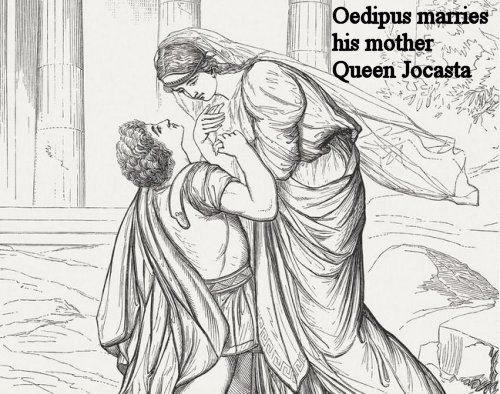 |
The ancient Greeks were
convinced their God and Goddesses interfered with
their lives. Indeed, every chapter of the
Iliad describes how the Gods treated the
Trojan War as their own little playground. Due
to their sense of helplessness at the whims of the
Gods, the Greeks were understandably obsessed with
Fate. Consequently the legend of Oedipus
provoked a great deal of analysis. Two schools
of thought emerged: Aristotle's Fatal Flaw
versus Sophocles' Blindness.
"Hamartia" is a Greek term for
Fatal Flaw. The concept was made famous by Aristotle
in Poetics, a treatise concerned with the
nature of Tragedy. Aristotle raised the possibility
that some people are born with a Fatal Flaw character trait.
Aristotle believed certain people who were given great
blessings also possessed a hero's tragic flaw. This
flaw would one day lead to errors culminating in downfall.
However, Sophocles saw things
differently. Thanks to his brilliant play
Oedipus Rex, 'Sophoclean Blindness'
became a term which refers to the tension between
human freedom and divine destiny.
In the opinion of Sophocles, Oedipus was a victim of cruel
Fate. Due to Blindness concerning the details of his
birth, no amount of foresight or preemptive action
could remedy the outcome as predicted by
Prophecy. Therefore, according to Sophocles,
Oedipus bore no responsibility for
his mistakes. As such, Oedipus
should not have inflicted such a terrible punishment on
himself. Yes, Oedipus had every right to feel an
inevitable sense of regret, but it was a mistake to feel
Guilt. Let go of the Guilt and lead a good life in
memory of ones lost. In other words, the real tragedy
here was the pain Oedipus inflicted upon himself.
|
COSMIC BLINDNESS
THROUGH THE LENS OF MYTHOLOGY:
PARIS, PRINCE OF TROY
|
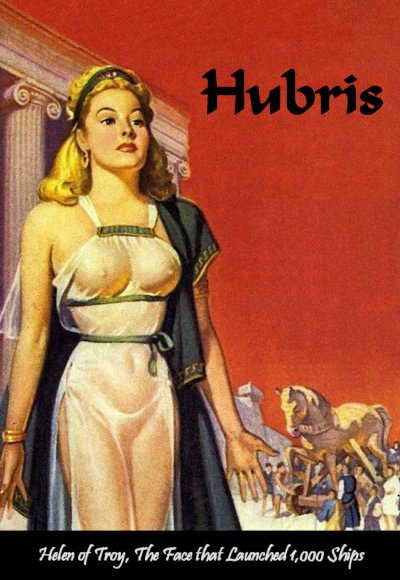 |
Perhaps some people of Privilege feel
entitled to do whatever they wish. Blessed by Fate,
they get a little too preoccupied with their own importance.
In 1870 Frank Calvert and Heinrich
Schliemann excavated a suspicious hill in western Turkey.
Imagine their shock to realize they had just uncovered the
so-called mythical city of Troy. Unfortunately, we
have no idea whether the fantastic stories of the Trojan War
depicted in Homer's Iliad are true, but
they sure are interesting.
The ancient Greeks were onto
something when they came up with the word 'Hubris'.
Observing one senseless mistake after another, the Greeks blamed
incomprehensible mistakes on a
dangerous sense of over-confidence. Their word was Hubris,
excessive pride, an unjustified favorable opinion of one's
own abilities. If you claim you are the best, then you
have to prove it. Otherwise Hubris can lead to
embarrassment and humiliation. Hubris is another way of saying
"A man's gotta know his Limitations."
Some men will overestimate their own talent if the
temptation is too great. In the case of Paris, Prince
of Troy, he succumbed to overwhelming temptation of
possessing the most beautiful woman in the world. This wasn't the first time Beauty turned a man's eye to
his destruction, but it is the most famous. History shows Passion has a way of
making men stupid. In addition, Paris was blinded
by Aphrodite's promise to help him obtain Helen if he would
vote for her in a Beauty Contest. Isn't Greek
Mythology great?
A major characteristic of Cosmic
Blindness is the tendency to overlook the Risk.
For a person afflicted with Hubris, the danger doesn't seem to matter.
Everyone says the Trojan Horse was the dumbest thing anyone ever did, but I
don't agree. The decision of Paris to steal Helen from the Greeks was
equally
dumb. What on earth made Paris think he could keep
her? Having offended King Menelaus, the world's
most powerful man, there would be hell to pay. And so
the Greek ships sailed.
Paris had been
warned. His sister Cassandra predicted the Trojan War
would ensue if Paris failed to walk away from
his love for Helen. A war? Really? Did that stop him? Heck,
no! Why worry about others when personal ambition is
involved? Blindly ignoring the full consequence of his
action, Hades was soon overflowing with new
occupants. Paris would be one of them. That is
because Pride goeth before the Fall.
|
COSMIC BLINDNESS
THROUGH THE LENS OF HISTORY:
CHAPPAQUIDDICK
|
The story of Paris and Oedipus
are useful illustrations of Cosmic Blindness at
work. However, no one takes Mythology
seriously, so let's switch to Reality. In the centuries that have
followed, History has seen story after story of
brilliant people who make colossal errors.
This tendency disturbs us all. If our best and
brightest can't avoid making serious
mistakes, then what hope is there for the rest of
us?
|
Due to our obsession with
Heroes, whenever analysts
discuss the unexplainable misfortune or missteps of
an Über-celebrity, the
question is asked: Was this person
felled by their own shortcomings
or were they a victim of cruel Fate?
No
doubt Ted Kennedy asked this same question many
times throughout his life. It took Kennedy ten hours to report the accident at
Chappaquiddick. Was Kennedy's poor
judgment impaired by selfish concern over his
political future or was his mind rendered dazed
by the extreme trauma of the
accident? Or was he a victim of Fate?
Writer after writer asked how a
talented person like Ted Kennedy could make such a
terrible mistake. Was there any excuse? The worst irony became
public many years after the accident. We
now know that Mary Jo Kopechne may very well
have stayed alive for some time by breathing a small air
pocket trapped in the ceiling of the car. With estimates ranging up to three
hours, swifter action would have saved her life.
Although the Senator turned his life around and
stood for important social issues such as race
and health care,
I despised Ted Kennedy throughout my life. However, as my thoughts crystallized
around Cosmic Blindness, it crossed my mind that
Kennedy may have been been forced to fall asleep at the wheel. If this
accident was a Fated Event, how tough would
it be to turn Kennedy's brain to mush at the key
moment?
Kennedy's mistake is not
easy for onlookers to forgive, but it does possess the
Hallmark characteristics of Cosmic Blindness. As we shall see,
gifted people are just as prone to the mysterious malady
known as Colossal Stupidity as normal people.
"Talent and
intelligence will not inoculate anyone against the
Caprice of the Fates."
|
 |
COSMIC BLINDNESS
through the lens of history:
CAPTAIN SMITH OF
THE TITANIC
|
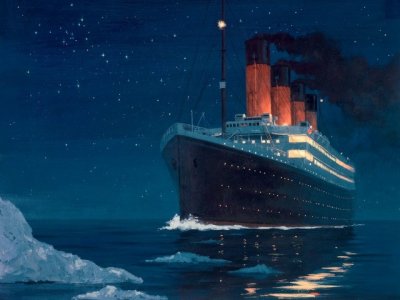 |
Cosmic Blindness suggests
at certain times we will be helpless to
prevent a moment of extremely poor judgment.
No matter how smart we think we are, if it
is our turn to make a serious mistake, we may be
handed a Very Bad Idea and tricked into
believing this is our own thinking. For example, what do you
suppose Captain
Smith thinking on the night he drove his ship directly into a field of giant icebergs?
If Captain Smith was in his Right Mind, then
he was guilty of criminal negligence. However, if you believe in Cosmic Blindness, the answer
is that Smith was not thinking at all, but rather
placed on automatic pilot by a Higher Power.
Based on what I have read, Smith behaved like a puppet on a string
when he
gave the order to sail blindly into the night.
The Romans had a phrase for it, Non Compos Mentis.
In my opinion, Captain Smith was out of his mind.
In this case, a tragic Event such as the sinking of the
Titanic takes on a whole new slant.
If Captain Smith was out his mind, then his name
should be cleared by
reason of Fate-induced insanity.
|
Prior to the
Titanic tragedy, every description of Captain Smith
portrayed an image of a serious man who deserved the
widespread respect given to him. Edward John Smith spent his entire life around
ships.
Born in 1850, from the moment he was a teenager, Smith worked full-time
on boats. In 1875, Smith earned a master’s
certificate which allowed him to pursue a career as a captain.
In 1880,
Smith, now 30, became a junior officer with the White Star
Line. In 1887, Smith was given command of his first
ship. Over the next 25 years, Smith proved himself
time and again as an able captain.
Rising through
the ranks, in 1912 Smith was White Star’s senior captain.
At the time of his posting, Smith had 25 years of experience
as commander. Smith was a
dignified man
who was well liked by crew and passengers alike. His nickname
was 'The Millionaire’s Captain' due to his popularity with wealthy
travelers.
One would assume Captain Smith had gained their trust
through his considerable experience and reputation for
careful leadership.
White Star asked
Captain to guide
the Titanic specifically because many
well-heeled passengers refused to sail with anyone but him.
Smith, 62, had made it clear he wanted to retire, but White
Star asked him to reconsider due to the prestige of the
Titanic's maiden voyage. Reluctantly, Smith left the command of
White Star sister
ship Olympic to assume control of the
Titanic. He did so with the understanding that he would retire
at the end of the trip. The Titanic
left Southampton, England, on its maiden
voyage from to New York City in April 1912 with Captain Smith was at the
helm.
|
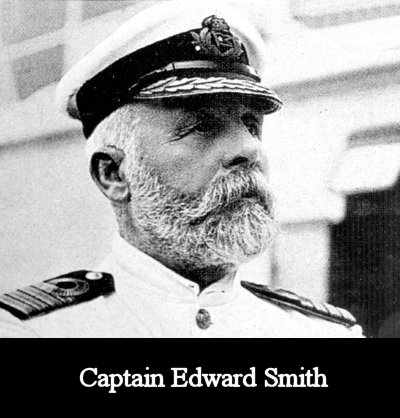 |
The point is that Captain
Smith was considered the BEST CAPTAIN IN THE
FLEET. Based on the man's lofty
reputation, it was highly out of character for Smith
to behave so
recklessly. However, Smith was so out of it he
did not even bother to slow down. Let me
add something else I find troubling. I
have yet to understand why his deeply alarmed
staff failed to object. Did everyone on
this Voyage of the Damned lose their mind that
night? This was the worst case of
collective stupidity since the Trojan Horse.
Due to
the bizarre Jekyll-Hyde contrast, I believe
Captain Smith's
better judgment was suspended until it was too
late. For
this reason, I say forget about Reality and
switch to Mysticism. However, very few
people
think like I do. The entire Internet is
filled with explanations looking for a way to explain Smith's
unfathomable breakdown.
"Oh, Captain
Smith, that damn fool!
What could have possibly caused Smith to lose
his mind?" Was he drunk?
Did the boss give him an order to proceed?
Other people offer psychological
profiles to support their conclusions.
I just roll my eyes. What theory explains
how a good man could turn into a complete idiot?
Angry at the world? Come on now, this was
a contented man looking forward to retirement.
Too much pressure from the boss? Smith was
ready to retire, so tell to the boss to jump in
the Atlantic. For crying out
loud, it was Midnight and Smith was facing an
entire field of ice. All the Captain had
to was stop for six hours and wait for daylight.
What was the hurry?
My Readers may
be surprised to find I don't have a problem with Psychology.
As I said earlier, I live by the Rules of
Reality just like everyone else. I am an avid fan of Self-help books,
I have a degree in Psychology and principles of Learning, Conditioning,
and Motivation made sense. However, in Extreme
situations, I contend these armchair analysts
with their pie in the sky theories are wasting
their time. Why delve through a long list
of complicated Freudian Complexes when the
answer may be as simple as accepting the Power
of Fate removed the Captain's mind?
Sure, my idea is just as
pie in the sky as anyone else, but if you are
not careful, my weird theory of Cosmic Blindness
may begin to grow on you.
|
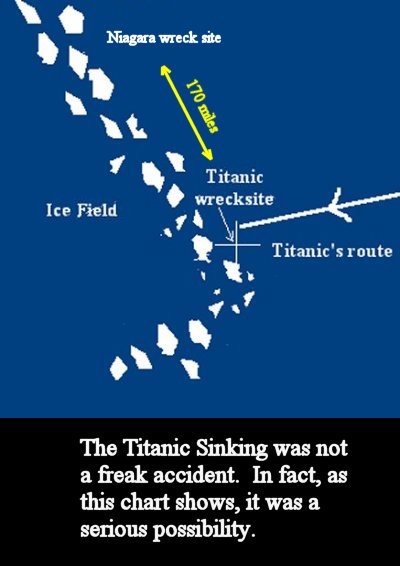 |
Personally speaking, I
think the sinking of the Titanic
had Fate written all over it and I have an odd
way to prove it. Let me ask my Reader a
question. Are you are fan of horror
movies? If so, then you know there is
always some fool who defiantly insists they are
not afraid of the Boogie Man. You know
what this means and so do I. We
immediately look at each other and nod.
Yup, this guy's gonna be the first to go.
So where am I going with this? Believe it
or not, some idiot had the nerve to say, "Even
God could not sink the Titanic!" OMG!
Talk about a ship marked for death! But
why stop there? Making matters worse,
Captain Smith made an eerie statement of his
own.
"When anyone asks me how I can best describe my experience in
nearly 40 years at sea, I merely say
UNEVENTFUL. Of course
there have been winter storms and gales and fog and the like,
but in all my experience I have never been in an accident of any
sort worth speaking about. I have seen but one vessel in
distress in all my years at sea, a brig, the crew of which was
safely taken off in a small boat in charge of my third officer.
I never
saw a wreck and have never wrecked, nor was I ever in any
predicament that threatened to end in disaster of any sort.
As one can
see, I am not very good material for a story.”
-- Edward
Smith, New York Times,
May 16, 1907
OMG! Did Captain Smith really say that? Hasn't he ever
seen a Horror Movie? Talk about a prophetic statement that drips
with irony. Hey, if I'm James Cameron, I am putting Captain
Smith in Act One so he can be the guy who insists he is not afraid
of the Boogie Man.
|
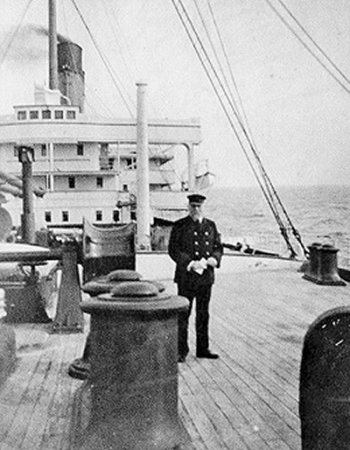 |
Sad to say, due to Smith's
total lapse of judgment, he goes down as the man responsible for
the most infamous story in maritime history. I feel sorry for
Captain Smith.
As the ship sank and people lost their lives,
his sense of guilt must have been overwhelming. However, before
we rush to censure, keep in mind this is the same man who possessed
a sterling record for correct
decisions. If one can accept the
merits of the Cosmic Blindness theory, it allows us to
view
Smith's destructive behavior in a much different
light. I realize it is difficult to believe God would
deliberately mislead a decent man like Smith into shameful
notoriety, but what if it is true? I for
one believe Captain Smith should be given the benefit of the doubt.
Fifty years of dedicated service should count for something.
In conclusion,
we are faced with a mystery that has no good
answer. For one brief,
terrible moment in time, Captain Smith mysteriously lost his
mind. I contend Captain Smith may have been turned into a Blind
Fool by forces operating
beyond his awareness. However,
I do not expect
the Reader to buy my theory off-hand. I am not even
sure I believe it myself. The idea of a celestial
being intentionally clouding a man's mind to cause this
tragedy is
repugnant to say the least.
However, while it is hard to believe in the concept of a man
whose sense was deliberately removed,
in Smith's case it is
harder to believe in anything else. If the Titanic was doomed
to meet its Fate, then the simplest way to accomplish that
was to cloud the mind of the Captain.
I understand this is a controversial theory and I admit I
have no way to prove it. However, I do have Captain
Smith. Captain Smith
is
the Universal poster boy for Cosmic Stupidity.
|
COSMIC BLINDNESS
through the lens of history:
MOSCOW BURNS
|
A key
feature of Cosmic Blindness is 'Uncharacteristic
Behavior'.
No one ever
accused Napoleon of being stupid. However,
apparently even military geniuses have their blind spots.
Napoleon's decision to attack Russia made perfect
sense on paper. Against his army of half a
million, the Russians never had a chance.
Their army had little equipment
and virtually no training. Consequently the Russians
employed an unorthodox strategy. Refusing to
fight Napoleon's massive army, they constantly retreated
deep into their country and burned their crops along
the way.
As Napoleon
watched countless Russian peasants starve to death,
he knew exactly what the enemy was doing. Even
when Cossacks attacked his food supply lines from
the rear, Napoleon was not worried. He
assumed his army would find plenty of food once they
got to Moscow.
And what did the Russians
do? When Napoleon arrived at Moscow, they burned
the city down to deprive his army of food. Checkmate.
Why do you
suppose Napoleon never saw this coming? As
Napoleon's starving army slunk back to France, the
smartest man in Europe had plenty of time to wonder how
he could have ever been so blind.
|
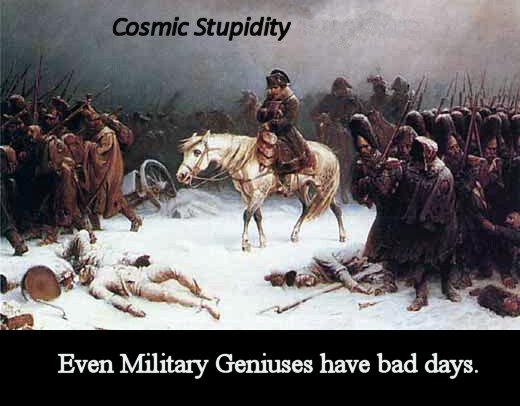 |
COSMIC BLINDNESS
through the lens of history:
HISTORY REPEATS
ITSELF
|
A major feature
of Cosmic Blindness is Arrogance. Perhaps Adolf
Hitler had a competitive streak. Possessed by an overwhelming sense
of superiority, my guess is that Hitler was conceited enough to
prove to the world he
could succeed where Napoleon had failed.
In 1941, Adolf
Hitler was on a roll.
Supremely confident after easy victories in
Western Europe, Hitler broke his non-aggression pact with Russia. The Soviets were
caught totally by surprise and suffered appalling losses. Unlike the retreat strategy used against Napoleon,
Stalin told his men to stand and fight or be shot in
the back. Faced
with better armed and better trained Germans,
Stalin's heavily-criticized decision cost millions
of lives.
Nothing could stop the Wehrmacht!
Well, yes,
nothing could stop them, but
Stalin's
ruthless decision to fight for every
inch did manage to slow the Germans down.
Given time to regroup, Russia stood its ground in the
firm
knowledge their secret weapon was about to kick
in. And so it did. 1941 was a
particularly cold winter with temperatures
dropping to -40°C. The Germans were not equipped in
terms of clothing or weapons. German
machine guns were frozen solid.
German Panzer tanks had narrow tracks which
could not cope with the deep snow. Meanwhile
Soviet tanks were effective due to much wider
tracks. Ultimately the Russian Winter halted
the Wehrmacht just outside the gates of Moscow in
December. Checkmate.
|
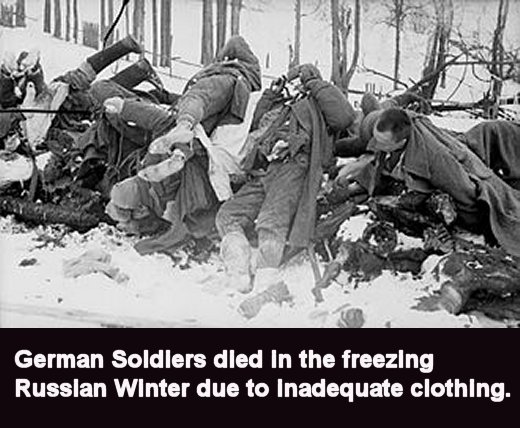 |
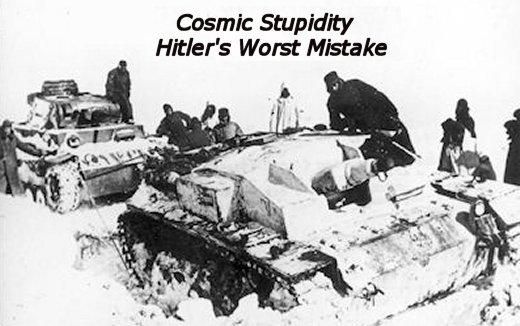 |
Ironically, the German offensive had started on a warm summer day.
However, the Germans underestimated Stalin's reputation for
ruthlessness. His heartless decision to slow the Germans down at
any cost delayed the attack just long enough for the Russian Winter to
save the day.
However, thanks to Napoleon, there was
nothing secret about their secret weapon. Hitler knew full well he was taking a chance.
“Books, books, always books!”
wrote August Kubizek, young Hitler’s friend as teenagers. “I just can’t imagine Adolf without books. He had
them piled up around him at home. He always had a
book with him wherever he went.”
One would assume Hitler had read about
Napoleon's stunning absence of judgment in attacking Russia. Furthermore,
so had his generals. They warned Hitler of the danger
repeatedly, so why didn't he listen?
There's an old saying, 'Forewarned
is forearmed.'
Perhaps Napoleon never anticipated
the danger, but what was Hitler's excuse? He knew
full well that attacking Russia could be a mistake.
Unfortunately, Arrogance was Hitler's fatal flaw. And so History repeated itself when Hitler senselessly
repeated Napoleon's greatest blunder. Thank goodness.
|
COSMIC BLINDNESS through the lens of history:
ROBERT E LEE LOSES
HIS MIND
|
Robert E Lee first came to the
attention of Major General Winfield Scott during the Mexican-American
War. Distinguishing himself in one battle after another, Lee was
commended by Scott for "the greatest feat of physical and moral
courage performed by any individual, in my knowledge, during the
campaign." General Scott would later add that Robert E. Lee
was "the very best soldier that I ever saw in the field."
Prior to Gettysburg, Robert E. Lee established
a reputation as a top-flight general. Performing
brilliantly, Lee whipped the superior forces of
the North time after time. Why do you suppose Lincoln replaced one
Union General after another? Scott, McClellan, Banks, Burnside,
Hooker, Sickles, Meade, McDowell. Despite being constantly outnumbered,
Robert E Lee ran circles around
every one of his Federal opponents.
Due to his seeming invincibility, historians have
long been at a loss to explain how and why Lee's winning streak was interrupted at Gettysburg. Excuses abound. Richard Ewell
allowed the North to gain possession of the High Ground.
Jeb Stuart's absence deprived Lee of an accurate scouting
report. James Longstreet was too worried about
casualties to attack with
unbridled fury.
Personally, I think Robert E Lee was
blinded by Fate. He made inexplicably bad mistakes
on back to back days.
|
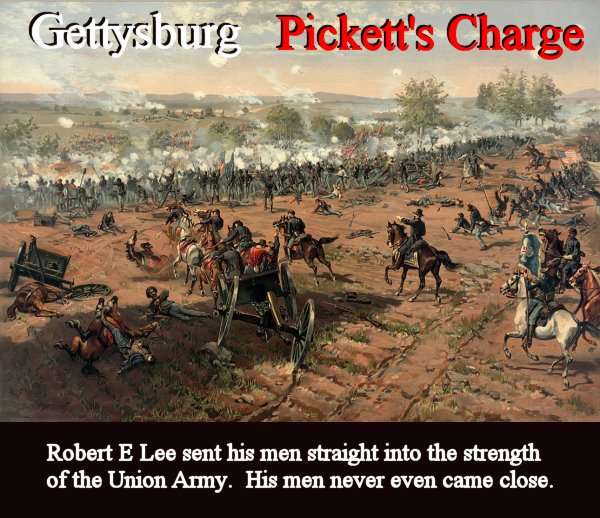 |
On the second day of battle
Lee cost his army its best chance for victory by
insisting his orders be followed to the letter.
This story is often referred to as Hood's Protest.
It is said that one element of
Napoleon's genius was his willingness to allow his generals
to make snap decisions based on changes seen on the
battlefield. This flexibility allowed his generals to
take advantage of unexpected opportunities. Not so
General Lee. He wanted things done his way.
As part of a
coordinated attack on July 2, 1861, Confederate General John Bell Hood advanced toward Round Top on the extreme left flank of the Union
army. In a shocking development, Hood received
a report that a hill known as Little Round
Top had been left vacant when Union General
Daniel Sickles disobeyed a direct order.
Sickles had moved his troops forward to a
Peach Orchard, a position he liked better. Due to this insipid
action, Little Round Top was poorly defended.
However, a frontal assault was daunting since the hill benefitted from a steep slope and
giant boulders that made for a strong defensive
position. So why not attack from the rear?
Hood knew exactly what to do.
Rather that go straight at Little Round Top, all he had to
do was swing to his right, go AROUND the hill and attack
from the rear. There was NOTHING
stopping him. However, James Longstreet,
Hood's
direct superior, refused to give permission even
though Longstreet agreed with Hood.
Hood protested to Longstreet four
times to no avail. He begged to be allowed to march
farther to the east, in hopes of getting in behind
Little Round Top.
Longstreet
said,
“Gen’l Lee’s orders are to attack up the Emmitsburg
road. We must obey the orders of General Lee.”
|
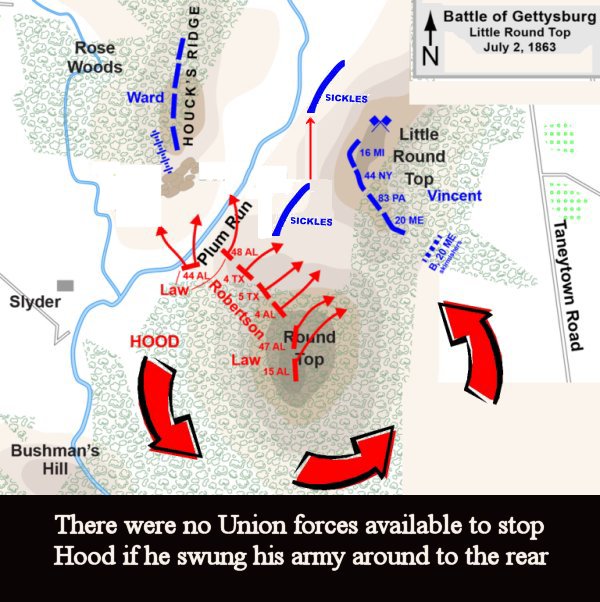 |
Hindsight has bedeviled the
South ever since. Lee's original plan had been
correct based on the scouting report of Sickles'
initial position. However, no one could have
predicted Sickles was a complete idiot (or did the
Invisible Man whisper in his ear?). Sickles
last-minute decision, made without permission, left
both Round Top hills without
reinforcements in case the Confederates swung around
the flank. Surprisingly, Sickles'
unpredictable movement became the perfect defensive
move to thwart Lee's original plans!
So here
we have FOUR cases of EXTREME stupidity. Lee
was wrong to insist Longstreet follow his orders.
Longstreet was wrong to obey the orders given
that he knew Hood was right. Hood should have
disobeyed orders anyway. Sickles came
within an inch of making a colossal blunder.
If Hood had disobeyed Longstreet, turn out the
lights, the party's over. However, in a case of overwhelming irony, Sickles
later demanded he be given complete credit for
saving the day due to his 'brilliant decision'.
Incredibly, Sickles got someone to agree with him.
Sickles was awarded the Medal of Honor.
This, my friends, is a phenomenon known as Dumb
Luck.
Lee compounded his error on
the following day by sending General George
Pickett straight into the teeth of the Union
defense. Known today as "Pickett's Charge",
this reckless attack had virtually no chance of
success. In fact, historians say it was
tantamount to suicide. Lee's plan called for 12,500 men
in nine infantry brigades to advance over open fields for
three-quarters of a mile under heavy Union cannon
barrage and
rifle fire. Not just that, the Union soldiers were
protected by a low stone wall from which they could reload
without fear. Even though some brave Confederate
soldiers made it to the wall, it was effortless just to
shoot the unlucky few.
Prior to battle, General James
Longstreet repeatedly stressed the utter futility of the
attack. However, when Lee refused to
listen to reason, Longstreet's
prediction of a bloodbath came true. The
Confederate soldiers never came close and were repelled
with a 50% casualty rate. The North counted 1,500
men killed or wounded. The South had 5,000 killed or
wounded plus 4,000 taken prisoner. It was a defeat of
such colossal magnitude that the South would never recover.
In the aftermath of Gettysburg, many
books have been written attempting to defend Robert E. Lee's
inexplicable failure of judgment. Longstreet is a
favorite target. If Longstreet had disobeyed Lee on
Day Two, the South would likely won the battle.
If Longstreet had disobeyed Lee on Day Three, the South
would have been in position to fight another day with its
army intact. However, Longstreet had been made second
in command for a specific reason... his loyalty and willingness
to do things the way he was told to. Is it fair to
blame Longstreet for his failure to obey orders?
I will leave that for the historians to argue about.
As for Robert E. Lee, he made the two
worst decisions of his life during this pivotal battle. Why would this otherwise brilliant
tactician suddenly turn into a stubborn fool who refused to
listen to advice? History offers all sorts of
explanations, but I suggest Cosmic Blindness was
responsible. If Fate called for a Union
victory, the easiest way to accomplish that was to rob
Lee of his common sense.
|
COSMIC
BLINDNESS:
WINSTON CHURCHILL
LOSES HIS MIND
|
Half a century after the
disastrous Pickett's Charge, yet another suicidal
charge sent thousands of young men to their doom.
The location was Gallipoli, a
peninsula in Turkey that guarded the entrance from the Aegean Sea to the Black Sea. The Cosmic Fool was
none other than
Winston Churchill
World War I had bogged down into trench warfare
along 500 battle-scarred miles known as the Western
Front. Britain and France suffered a million
casualties in the first four months alone.
Since then
the war had devolved into a deadly stalemate with muddy ditches
and countless men
fighting over small patches of no man's land.
The costly impasse frustrated Winston Churchill, a
rising star of British politics. He believed a
second front would break the impasse. Using
his position as First Lord of the Admiralty,
Churchill proposed sending a fleet through the
Dardanelles, a narrow waterway which served as the
door to the Black Sea. By reaching the Black Sea,
England could open up a second front at Germany's
undefended back door. Unfortunately, the
poorly imagined invasion
failed miserably. 32,000 men died, many more
were wounded.
Although blame was shared by
many, Churchill became the prime
scapegoat. Now disgraced, Churchill was
demoted to an obscure cabinet post. In
protest, Churchill resigned. He picked up a
gun and headed to the Western Front to join the
infantry for the remainder of the war. “I am the
victim of political intrigue,” Churchill
lamented. “I am finished!”
Fortunately for
all of us, Churchill would get a second chance.
|
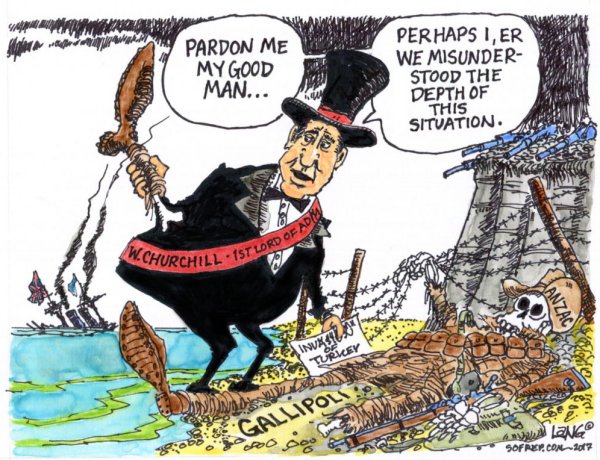 |
COSMIC
BLINDNESS:
THE MAGINOT LINE
|
Ordinarily I
focus my attention on famous individuals, but I also
believe that entire groups can be blinded. The
most famous example was the Trojan Horse, a
situation where an entire city went to sleep at the
wheel. However, that story is easily dismissed
as mythological fiction. Not so easily
dismissed is the story of the Maginot Line.
Following catastrophic losses in World War One,
France built a very impressive fortification along
the Rhine River. Unfortunately they forgot the
old adage that you are only as good as your weakest
link.
Counting on
Belgium's rugged Ardennes Forest to shut down
Germany's tanks, the French badly miscalculated.
It was not enough for the French to overestimate the
power of fallen trees to stop powerful tanks, a
concerted defense of the forest was ignored. Once the Germans penetrated the
poorly defended forest to
enter France, they captured half a million
soldiers by attacking the Maginot Line from behind. And so, yet again, those who decide to fight wars do
not actually fight them. Meanwhile the
battlefield is filled with sparkling white crosses
of the dead, very few of whom (if any) are generals.
As for Andre
Maginot, the man behind the Very Bad Idea, he had
the good sense to die before the start of World War
II.
|
 |
COSMIC
BLINDNESS:
OMAHA BEACH ON
D-DAY
|

Does anyone
know why the Normandy Cemetery is located where it
is? I give credit to Heinrich Severloh, a German
sometimes referred to as the Butcher of Omaha.
In his memoir, Severloh claimed he fired 12,000
rounds over nine hours, killing an estimated 1,000
American soldiers in the process.
Anyone who has
seen Saving Private Ryan will no doubt
recall the startling image of countless dead bodies
lying on a beach at D-Day. Those men were victims
of Severloh's deadly machine gun. After the
battle was over, since most of the bodies were
concentrated in one spot, the corpses were carried
up the hill and buried in the area now known as the Normandy
Cemetery.
Should we blame
Severloh for this horrific loss of life? No.
In fact, I feel sorry for the man. Given no
choice in the matter, Severloh did what he was told.
If it wasn't Severloh, it was someone else. For that matter, Severloh later stated the profound
regret he carried for the rest of his life.
So who do we
blame for this unconscionable slaughter? I lay
responsibility for this massacre at the feet of the
military planners whose flawed strategy sent these
young men straight to their doom. As we now
know, they never had a chance.
|
 |
There is great
irony in this story. Here again we see the
results of what happens when squad leaders follow
their orders despite overwhelming evidence that their
orders make no sense.
In addition, we
see again that a defense is only as good as its
weakest link. In this case, the weakest link
was Adolf Hitler.
Our story
starts with Erwin Rommel, the brilliant German
general known as the Desert Fox. Rommel was
handed the task of preparing the defenses at
Normandy. Rommel was realistic enough to know
he could not prevent the Allies from landing their
soldiers on the beach. Instead he planned to
keep the attackers pinned down long enough for
reinforcements to arrive.
Rommel was not
sure where the Allies would land, so he stationed a
crack Panzer division in an area equidistant to the
likely landing sites. Located two hours
from Normandy, the Panzer tanks were prepared to rush
down the moment the invasion began. Rommel envisioned
his tanks would wreak havoc
on the helpless soldiers trapped on the beach.
Rommel's major
concern was preventing Allied tanks
from making their way into the French
countryside to thwart the advance of the Panzers. His main objective was to deny Allied tanks any
passage for at least two hours.
Rommel's job
was made much easier by the rugged Normandy
coastline. For miles on end, imposing hills,
bluffs, and cliffs made it impossible for any tank
to scale.
Unfortunately
for Rommel, there was one
weakness. Over time, small streams had cut
holes in the chain of hills every mile or so that
was wide
enough for a tank to drive through. Not a
problem, Rommel decided. He would guard
these occasional gaps with massive defense
fortifications known as Widenstandnester Units,
better known as WN's.
As one can see
by the death count of the Butcher of Omaha, these
WN's were murderously effective. Fortunately,
a
brave Captain named Joseph Dawson heroically
saved the day. By fortuitous chance, his
landing craft landed just barely out of the reach of Severloh's deadly machine gun
fire. Severloh's
weapon had a range of 700 yards. Dawson's unit
was lucky to land in a spot just barely beyond the
range of Severloh's Killing Field.
|

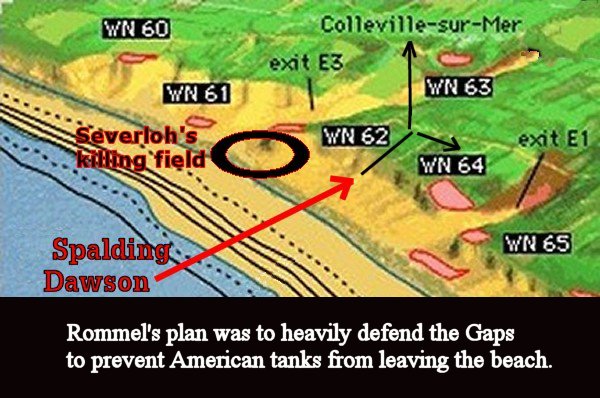 |
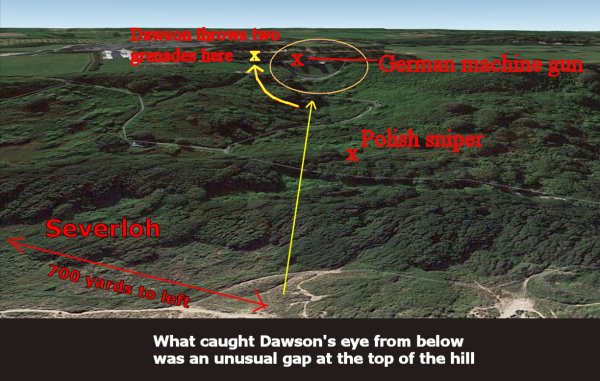 |
Although
Dawson had been ordered to attack Severloh's
position directly, that idea looked like an
invitation to suicide. Dawson took one look at
the gruesome number of mounting casualties and knew
following orders would ensure death for all his men.
Dawson
decided he would rather try the funnel-like ravine
on the hill before him. Dawson was
looking at a risky 350 yard climb to the top at
roughly a 30°
angle. Fortunately, the machine gun fire coming at
them from the hill was nowhere near as severe as
from the direction of the Butcher of Omaha. It
would be a tough, dangerous climb, but Dawson
believed this
direction gave his men their best chance of
reaching the top.
At this point,
Dawson got lucky again. Minutes later,
a second unit commanded by Lieutenant John Spalding
landed safely nearby. Spalding's unit would be
instrumental in helping Dawson once the two
companies left the beach.
Dawson
was facing three major obstacles. There was a
pillbox in front of the beach, a sniper's nest
halfway, and a powerful machine gun unit at the top
of the hill.
|
Due to
a third stroke of luck,
the
pillbox directly in front of Spalding and Dawson's
landing spot was either unmanned or had been
eradicated earlier.
"We walked across the beach unharmed because nobody
stopped us. I was curious why there was no MG
(machine gun) fire to speak of. Someone pointed
out a pillbox on the hill facing us that didn't
seem to be in operation. It doesn't hurt
to be lucky."
-- Lt. John Spalding
Amazing but true, Spalding and Dawson's units were
placed in perhaps the only spot in the Kill Zone
Triangle that was relatively free of the deadly WN62 and
WN64 crossfire.
No one
knew it at the time, but Rommel had decided to
scrimp on his hillside defenses.
Desperately short on manpower, the sniper's nest
facing Dawson was manned by a single soldier.
A captured Polish
man was forced to shoot at the Americans or risk
being shot in the back by the Germans above.
Fortunately, the Polish conscript was
deliberately not aiming very well. Dawson made
two decisions. Unaware the nearby sniper's nest
was not a threat, for safety Dawson told the men to stay put
halfway up the hill. Then he ordered Spalding's
unit to distract the machine gun nest at the top of
the hill with non-stop withering fire. With
the Germans preoccupied by Spalding's unit,
Dawson crawled 75 yards on his stomach inch by inch until he
was hidden beneath a ledge. His presence was
unknown to the two German gunners 15 feet
above.
Dawson
worked his way around the ledge to a better vantage
point. After pulling the pin out of two hand
grenades, he
bravely
showed
himself. The
two Germans spotted Dawson at the same time he spotted them.
30
feet separated them. Taking advantage of surprise,
Dawson threw the
grenades.
This
was kill or be killed, incredibly dramatic.
If Dawson hesitated to get a better aim, the bullets would reach him
first. If he missed his target, Dawson would be cut to shreds.
Would the grenades with their 4-second time delay
arrive
before the panic-stricken Germans swung their weapon
around to shoot?
Under
extreme pressure, Dawson threw a perfect strike from
30 feet away.
Dawson's decision to singlehandedly take out the
German machine gun nest cleared the day's first safe
passage to the top. From here, a swarm of GIs
made it to the top and systematically took out every
German WN position from behind. Joseph
Dawson's heroics became the major reason the death count at Omaha
Beach was not higher.
|
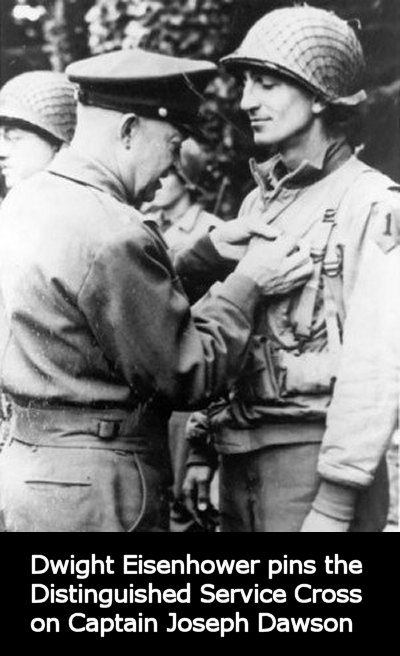 |
Ironically,
Dawson's heroics might well have been negated had
Rommel's ingenious plan been carried out properly.
The Panzers might have saved the day except for the
interference of a self-described military
mastermind. A known control freak, Hitler
insisted the Panzers were not to be released without
his explicit permission. Only one problem.
On the night before the invasion, Hitler gave strict
orders not to awaken him for any reason. Due
to a colossal error in judgment by the German High
Command, no one dared inform Hitler that the early
morning invasion was underway. By the time
Hitler woke up, the D-Day invasion had been
successfully completed and the Panzers were still
sitting there unmoved. Another example of Cosmic
Blindness? It certainly fits the description.
Unfortunately ,
German Blindness was more than equally matched by
American Blindness. For reasons that make no
sense, American strategy sent men straight into the
teeth of the German defense. It was Pickett's
Charge and Gallipoli all over again. The
D-Day planners were just as obsessed with Rommel's Panzers
as Rommel was with their tanks.
Unfortunately, the American tanks had to be unloaded
first while the Panzers were gassed and raring to
go. The Strategists knew it was a race against time. Would
they get their men off the beach before the German tanks
arrived? The planners decided it was urgent to take out the
German defense units at all costs. As a
result, every time a new wave of soldiers landed on the beach,
their orders were to run straight at the nearest
machine gun nest despite no
protection whatever. In other words, just
run straight at the Butcher of Omaha and die. And so
they did. The poor men were sitting ducks. 1,000 dead
bodies lay on Omaha Beach as stark testimony
to the ineffectiveness of the American assault
strategy.
As is usually
the case with Cosmic Blindness,
such is the
danger of Blind Obedience.
Except this
time, unlike James Longstreet and John Bell Hood at
Gettysburg, Joseph Dawson disobeyed orders and
saved the day. My favorite part of the story
was thinking about the cowering German generals who
obeyed Der Führer's
orders to make
sure the
military genius got
a good night's sleep.
I do not know why Tragedy is a
part of life. What I do know is that the
phrase 'Asleep at the Wheel' is unusually
appropriate for this story. Were it not for
Hitler's mysterious D-Day behavior, this story
might have had a much different outcome.
|
Cosmic Blindness: Pearl Harbor
|
No doubt my
ever-curious Reader wonders why I keep hammering
away at Cosmic Blindness. After all, I have
dedicated ten stories in this chapter to the subject
in addition to my own story.
Isn't that enough to make my point?
No! I
think the idea that our mind is periodically
controlled by forces beyond our awareness is so
abhorrent that most Readers prefer to dismiss the
possibility without a second thought. For that
reason, I intend to give people
a good reason to wonder. And so,
without further ado, here is another story.
|
When
President Roosevelt was informed of the attack on
Pearl Harbor, the first thing he asked was how the
Japanese managed to catch this vital base totally
unguarded.
On the
morning of December 7, 1941, George Elliott was
manning the radar equipment on the northern tip of
Oahu. Just after 7 am Elliott noticed an
unusually large number of blips on the radar, a
pattern which indicated a large number of planes. As
we now know, these blips reflected 353 aircraft
launched from four Japanese carriers. Elliott
showed the signal to Joseph Lockard who dismissed it
as a malfunction. However, Elliott disagreed.
Unsure what the signal could be, Elliott made a call
to the Information Center at Fort Shafter. No
one was available, so he awaited a call back.
Precious
seconds ticked off the clock. When the return
call came, Lockard answered. On the other end
Lt. Kermit Tyler dismissed the large blip as six
American B-17 bombers scheduled to arrive from San
Francisco. When Lockard hung up the phone,
Elliott protested. First, San Francisco was on
the northeast and the signals were on the west.
Second, the radar signature was so large there was
no way a mere six bombers could be responsible.
But Lockard had already hung up the phone and his
shift was over, so that was that. George
Elliott was new to this job, so he did not have the
confidence to continue his protest. Instead he
sat there and fumed with a helpless sense of dread.
Although
the correct call would not have prevented the
impending bombardment, a 15 minute warning would
have saved countless lives and material. U.S.
planes would have been airborne and ship guns
manned. But that is not what happened.
Instead, three men who were assigned the vital
responsibility of protecting Pearl Harbor fell
asleep at the wheel. Think about it... not
one, not two, but THREE MEN made the worst mistake
of their lives that day. How could they ignore
a radar screen that screamed 'Possible Enemy
Attack'? They were given
one
precious job to do and they blew it!
|
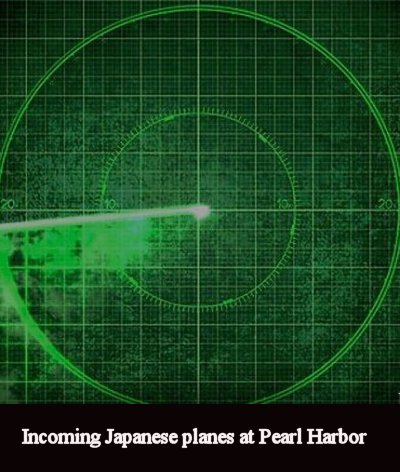 |
Pearl Harbor was a disaster waiting
to happen. Ships were jammed as tightly as
possible, planes were neatly lined in
easily-destroyed rows.
Don't bother to aim, just drop a bomb and watch it hit something.
President
Roosevelt had
every right to wonder why
no precautions were taken. The answer is
simple. No one was worried
because they had
Radar to protect them!!
Put yourself in their shoes.
You are a radar operator at Pearl Harbor who sees a
horde of unexplained blips coming at you on the
screen. No, they are not stationary, they
are coming closer! Your superior tells you this
giant mass of blips must be 6 airplanes
scheduled to arrive from San Francisco. Two
problems. San Francisco is on the right and
the blips are on the left. Furthermore,
considering 350
planes were headed to Pearl Harbor, how could 6
planes be the answer for the massive blob of signals
dominating the screen? Even a preschooler could do
the math, so why was it so difficult for three trained
professionals to figure it out??
How does
anyone explain such a colossal error? Freudian
complexes in three different men? By now you already
know my answer. If Pearl Harbor was a Fated
event, then something had to go wrong. If the
attack was meant to succeed, I wonder if these three
men had their judgment secretly impaired. This
story makes no sense!
|
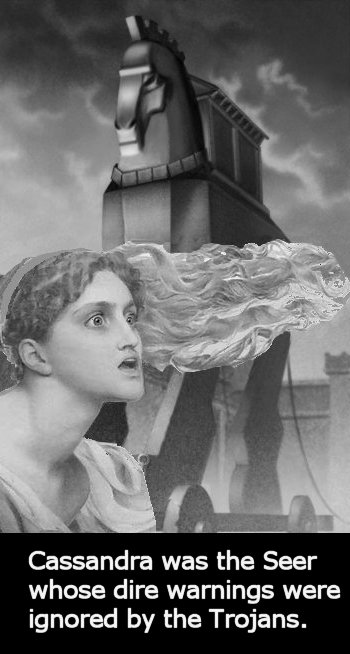 |
As it
turns out, Greek Mythology has a Pearl Harbor story of its very
own... the Trojan Horse. An entire city let down its guard
and put out the welcome mat for their sworn enemy.
One of history's most
startling examples of ignorance and stupidity was the decision
to haul the Trojan Horse inside the walls of Troy. We all
know how that turned out. Massacre.
Now ask
yourself this. Is it typical for a defeated
army to leave a Trophy behind and let bygones be
bygones? In the annals of History, how many
times has a defeated nation willingly donated a
lovely prize to the victor? Did the
Confederates leave behind a flattering statue of
Abraham Lincoln? Did the Yanks leave behind a
handsome portrait of Ho
Chi Minh as they abandoned Saigon? Of course not.
One
characteristic of Cosmic Stupidity is Blindness to
Danger. "Beware Greeks bearing gifts!"
The crazy part came when the Trojans decided to drag the giant
horse inside their walls. Hey, look, the Greeks put
wheels on the horse! Gee, how convenient. Too
bad those nice Greeks didn't stick around so we could thank
them. Hmm.
What on earth would cause an entire community to drag the Trojan Horse inside
their walls? Would it really hurt to leave the
giant horse outside for a few days?
Believe or not, the Trojans were warned
to be more careful. Cassandra was the daughter of Priam, King of Troy. Due to her
gift of prophecy, Princess
Cassandra fervently begged her father not to allow his men to
haul the mysterious Trojan Horse inside the gates of Troy. Priam
completely ignored his headstrong daughter and her vision of doom. So did everyone else.
No one would listen. In fact, they were
openly hostile, abusing the prophetess with harsh insults.
Labeled a fool and an idiot, Cassandra was determined to save
Troy. Grabbing an axe in one hand and a burning
torch in the other, she ran towards the Trojan Horse to
personally destroy the threat. The Trojans stopped
her and carried her away.
Here is the
problem. Give Homer credit for a very creative ending
to the Iliad. However, since this is
Mythology, this far-fetched tale was a figment of an
over-active imagination. We all know something this crazy could never happen in
real life! We are far too alert to let people secretly
invade our country and plan to destroy us. After all,
we have an Alphabet Soup of agencies to protect us and a
far-sighted collection of brilliant Pentagon Generals.
And yet in an eerie
repeat of Pearl Harbor, we all know what happened in 2001. The failure of the CIA/NSA/FBI to spot
the obvious warning signs of the 9-11
plot has been one of the most hotly contested issues in the
history of Intelligence. There have been commissions, internal investigations,
scholarly reviews and more.
Due to several warnings within the agency, people wondered how
the CIA could be so blind. Why didn't they connect the
dots?
|
Oddly enough, the
9-11 tragedy had a Cassandra of its very own. His name was
Tom Clancy. In his 1994
novel Debt of Honor,
Clancy wrote of a terrorist who uses an airplane as a bomb
to level the U.S. Capitol.
While he was writing the book, Clancy became disturbed that
this possibility was not as far-fetched as he first thought. Curious to see how the military had prepared for a real
attack of this sort, Clancy consulted an Air Force officer.
Here is what Clancy remembers from the meeting:
|
"I ran
this doomsday idea past him and all of a sudden this guy is
eyeballing me rather closely. I said, 'Come on,
General, I know you must have looked at this before.
Surely you've got to have a plan for it.'
And this guy
goes, 'Mr. Clancy, to the best of my knowledge, if we had
a plan to deal with this, it would be a secret and I
wouldn't be able to talk to you about it. But to the
best of my knowledge we've never looked at this possibility
before.'"
|
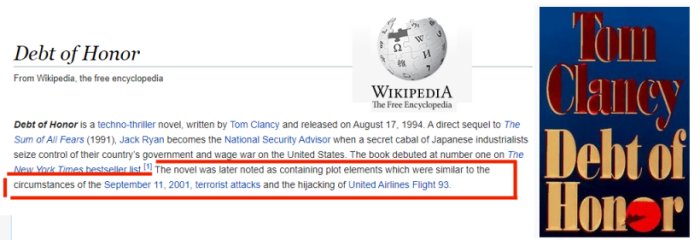 |
Tom Clancy had just spelled
out the mechanism for a deadly attack on American soil face
to face with a high-ranking General. This man had the
authority to act on the warning. Did the General do
something about it? No. He fell asleep at the
wheel. However, why scapegoat
this lone General? Why not
cast a wider net of blame? After all, anyone who read
the book should have seen the danger.
Debt of Honor
debuted in 1994 number one on the New York Times bestseller list.
The novel contained plot elements strikingly
similar to the circumstances of the 9-11 terrorist attacks.
That included hijacking an airplane to use as a giant guided
missile. Since Clancy was the hot author of the day, his thrillers were favorite reading material for everyone in
the Defense industry. That meant every military expert
at the Pentagon and every Intelligence agent had been
given SEVEN YEARS to consider a novel attack of
this nature.
While scouring the Internet for reasons that could explain
the profound negligence which led to 9-11, I came across dozens of
articles. Although every article had a different
slant, they all had one thing in common.
Each article was trying to explain how a tragedy of this
magnitude could come to pass (and not having much luck). To me, it was a replay of
the armchair Titanic analysts. Let's
face it, when something goes wrong, we all want to know what
caused it so we can prevent it from happening again.
As I reviewed the various articles, the field of Psychology
was often cited with possible answers. That made
perfect sense. After all, the field of Psychology arose because rational people
consistently have trouble finding logical explanations for behaviors
that make no sense.
Over the ages, scholars have done everything in
their power to answer one burning question: Why
do otherwise intelligent people make colossal errors
of misjudgment? Whenever this question is
raised, people run to Psychology for answers.
That is because Rational people fear the
Irrational. So let me ask a question. Which
Freudian Complex
caused Napoleon and Hitler to invade Russia close to
winter time? Which complex caused General Lee to attack the
strength of the Northern defense at Gettysburg rather than listen to the stern warnings
of his staff? Which
complex caused Winston Churchill to attack Gallipoli despite
being informed of the great risk? Which
psychological flaw prevented three men from
comprehending the danger screaming at them from the Pearl
Harbor radar
screen?
Which complex made a top-flight mariner like Captain Smith
send the
Titanic to an icy grave?
If there is one common theme that stretches
through every story, it is Obedience to Authority. We are taught
to see things a certain way and not to question. We are taught to
obey orders and ignore our misgivings. It is all part of the
socialization process. Let me offer a simple example. Assuming you
are familiar with the Titanic story, has it
ever occurred to you that Captain Smith was an unwitting
pawn of Fate on that terrible night? Probably not.
We are not taught to think that way.
And you know what? If a boy named Bob had
not come bursting into my German classroom when he did, I would probably
call Ted Kennedy a coward and Captain Smith an idiot just like everyone
else. But I was given an opportunity to look at things
differently. And so I have slipped into a Cassandra role and
written a book to suggest an alternative way of seeing
what we call Reality.
Perhaps Captain Smith
was not a reckless idiot, but rather a pawn at the mercy of
Fate. From
where I stand, people who pursue Psychology for answers are
barking up the wrong tree. Yes, Blind Spots and Poor Judgment
are a form of
Mental Illness. But did it ever occur to anyone that
Mental Illness can be imposed on us from beyond? If
you or I are in a position to affect the course of human
affairs such as manning a Radar Unit or guiding a ship on
its maiden voyage, it may be our Destiny to see things in a
certain misguided way.
Are you confident that the way you view the world
is the way it really is? Fate is a curious thing. No one
knows where Very Bad Ideas come from. Did you know some
people have even suggested Clancy's book is where Bin Laden got
his idea in the first place? Why did Bin Laden see
something that everyone in America completely missed? It's the
Trojan Horse all over again. We see what we are meant to see, we
will miss what we are meant to miss. However, unlike
the Muggles, we get to hang onto our memory. This gives us the
chance to reflect on experiences that do not fit our current view of
Reality.
If you are
starting to see my point, then I have
done my job.
|
In conclusion, I have several reasons
why I think an understanding of Cosmic Blindness is
important.
•
If Cosmic
Blindness is a fact, then Fate is also a fact.
The existence of Fate implies an order to the
Universe we can barely comprehend. Fate suggests that
our worst Mistakes are made for a reason. Cosmic
Blindness is another way of saying when something bad is
about to happen, it may be our Fate to fall asleep at
the wheel.
•
If
we are all destined to make at least two or three serious
mistakes in our lifetime, once it happens we should do our best not to make
things worse. Accept the mistake, apologize to the
appropriate people, vow never to let it happen again, and take action
to atone for the mistake.
•
When you
make a serious error, consider the
possibility that you had no choice in the matter.
Yes, it happened to you, so you are in charge of
cleaning up this mess. However, while it is
natural to feel guilt and shame, there is no point in
beating yourself to death over it. Excessive guilt is
counter-productive. Instead concentrate on how to make
amends. And, while you are at it, try to forgive
yourself. Spend as little time playing the victim
as possible. Look at it this way. You have
been handed a Bad Break, but the existence of Fate
implies a Higher Power as well as Justice in the
Universe. Fate
implies a system of rewards for good deeds and punishment
for bad deeds. So no matter how bad it is, don't give
up. Rather than hurt yourself
with self-destructive acts and excessive remorse, make the best of your situation and find a way to make the
world a better place.
•
At some
point in your life, you will do something Stupid.
It is Inevitable. When the time comes to be dealt
a bad hand, play the hand dealt to you with as much
skill as you are capable of. For if there is one
thing I am sure of, the harder we work, the luckier we
get.
|
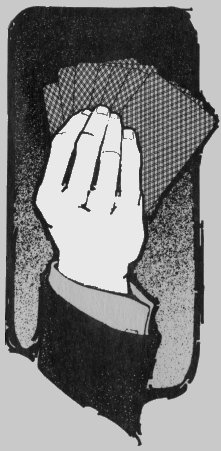 |
|
THE GYPSY
PROPHECY
Chapter
NINE:
THE ABYSS
|
|
|